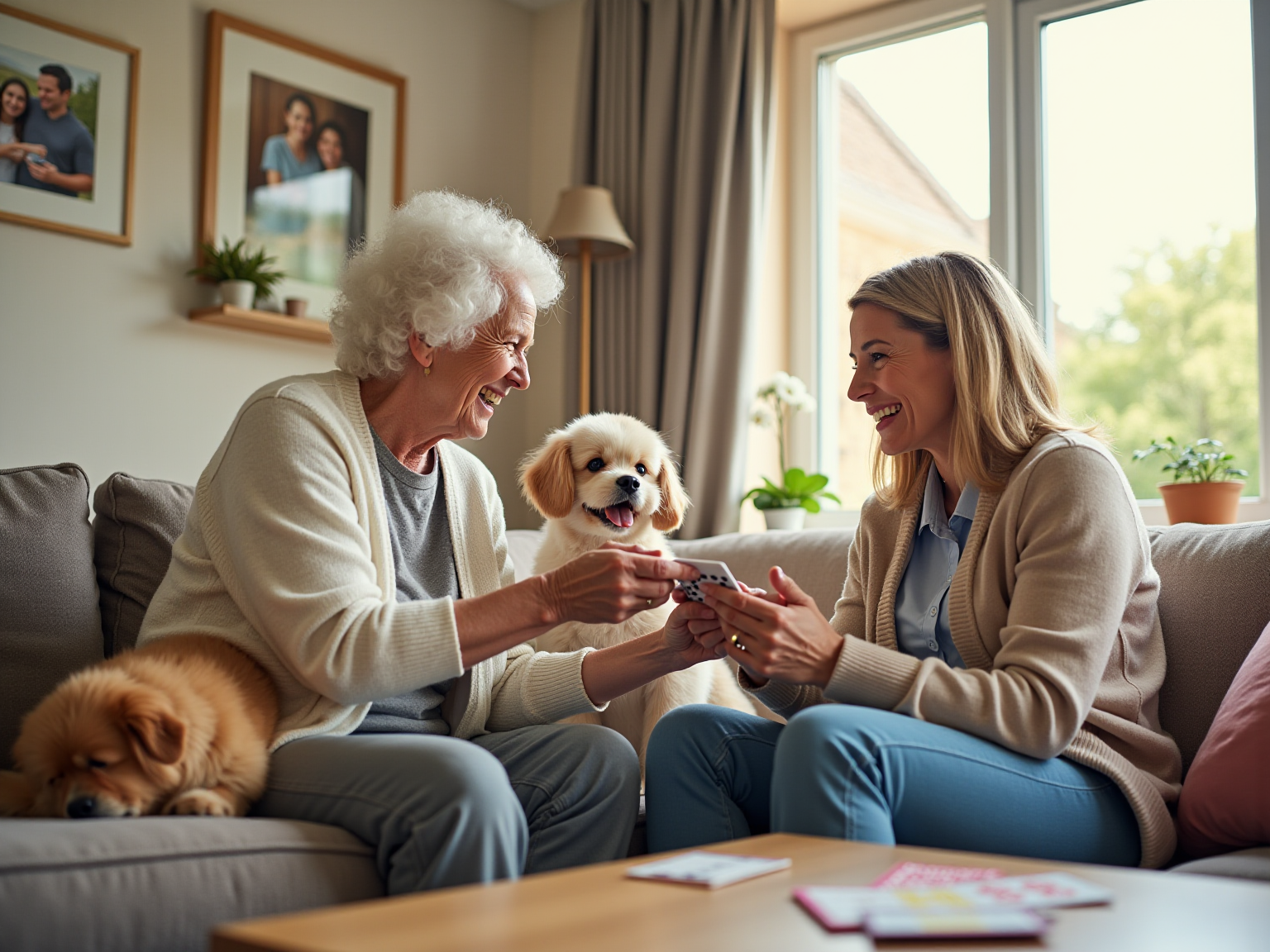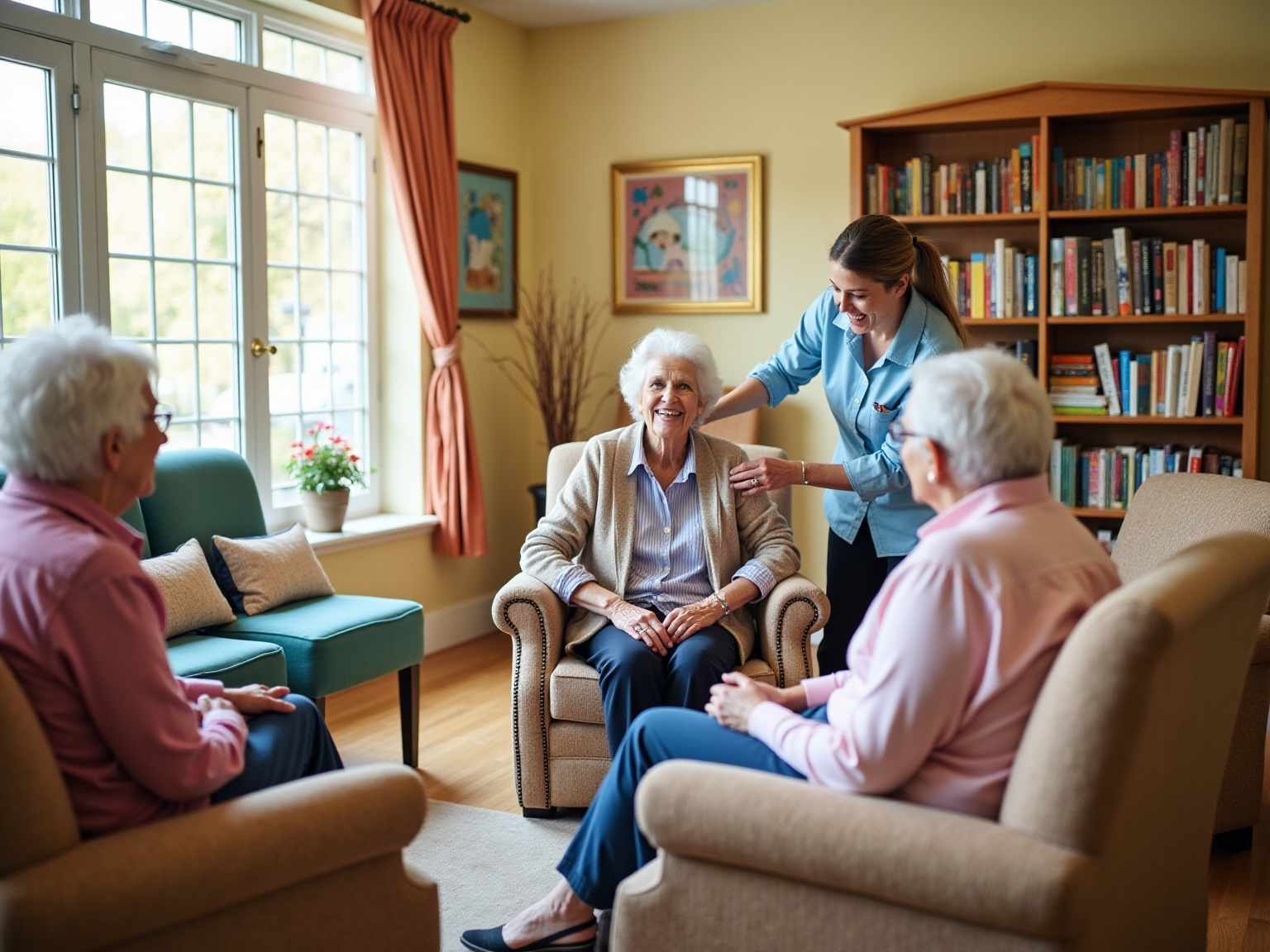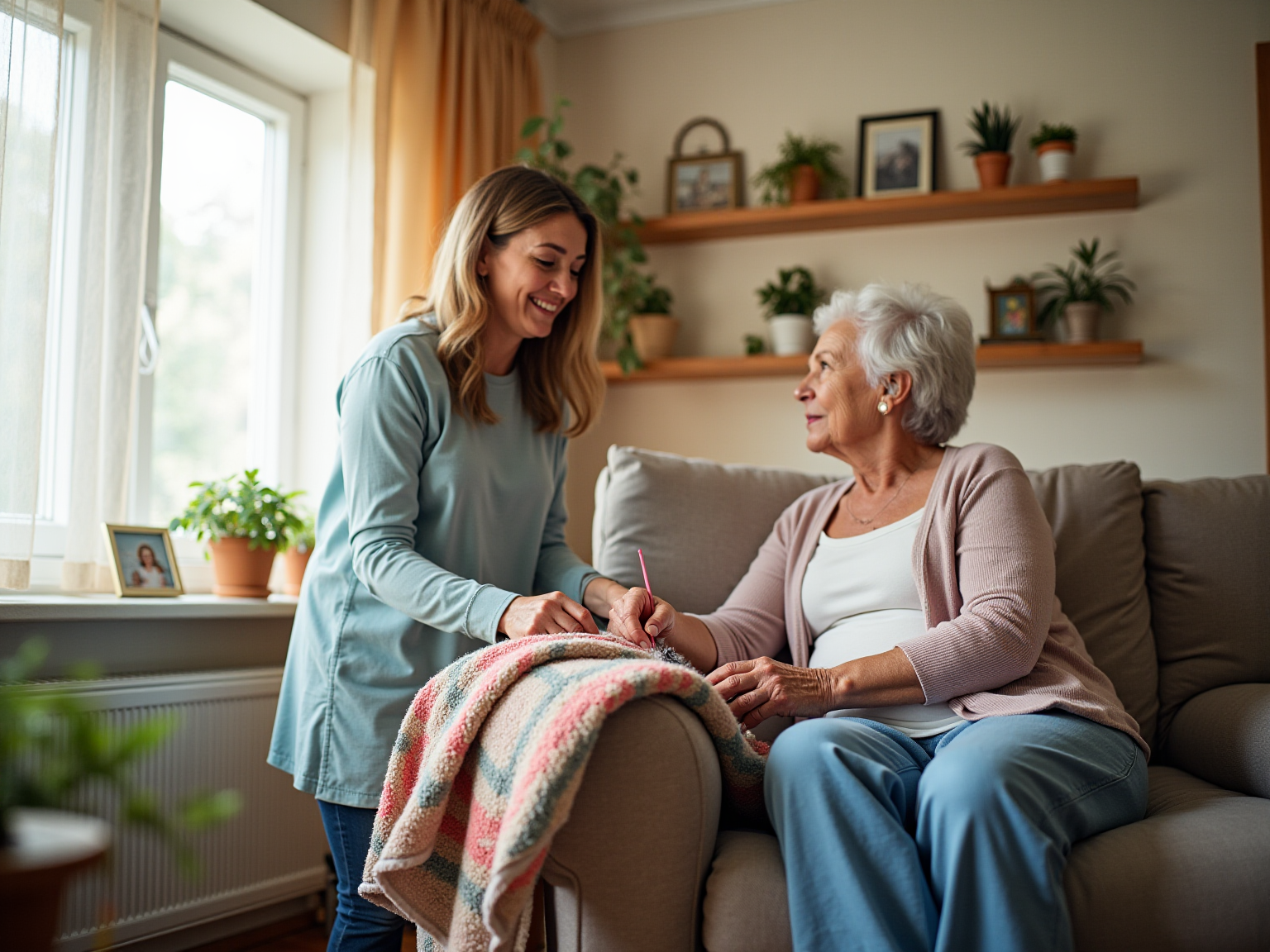Overview
When considering a companion caregiver, it’s essential to recognize the qualities that truly make a difference in care. Compassion, reliability, and strong communication skills are at the heart of effective caregiving. These traits not only enhance the emotional and physical well-being of seniors but also foster trust and build effective relationships between caregivers and their clients.
Adaptability and patience are equally important. Caregivers must navigate the unique needs of each individual, providing companionship and professionalism in every interaction. This commitment to education ensures that caregivers remain informed and equipped to offer the best possible support.
Ultimately, these qualities lead to improved care outcomes and greater satisfaction for both seniors and their families. Remember, your comfort is our priority, and we’re here for you every step of the way. If you’re seeking compassionate care, don’t hesitate to reach out and explore the options available to you.
Introduction
In the realm of caregiving, the qualities that define an effective caregiver extend far beyond mere technical skills; they encompass a profound sense of compassion, reliability, and adaptability. As our population ages and more individuals seek personalized home care, the importance of these attributes becomes increasingly evident. At the Best Care Nurses Registry, we understand that fostering emotional well-being, ensuring consistent support, and maintaining open lines of communication are essential for enhancing the quality of life for seniors.
This article explores the essential characteristics that caregivers must embody to provide exceptional care. We will highlight the significant impact these qualities have on both clients and their families. Through a comprehensive exploration of:
- Compassion
- Reliability
- Communication skills
- Adaptability
- Patience
- Experience
- Companionship
- Professionalism
- A commitment to ongoing education
it becomes clear that the heart of effective caregiving lies in the genuine connections formed between caregivers and those they serve.
In addition, we invite you to reflect on how these qualities resonate with your experiences or those of your loved ones. Your comfort and well-being are our priority, and we are here to guide you through this journey.
Compassion: The Heart of Effective Companion Care
Compassion in caregiving transcends mere kindness; it embodies a profound understanding and responsiveness to the emotional needs of individuals. At Best Care Nurses Registry, we genuinely believe that personalized care is vital, particularly for seniors who may cherish their beloved pets. Our pet-friendly approach ensures that both clients and their furry companions receive the support they deserve, fostering a nurturing environment that encourages seniors to express their feelings and concerns. This emotional support is especially crucial for older adults who frequently grapple with loneliness and anxiety. For example, those who listen attentively and engage in meaningful conversations can significantly alleviate feelings of isolation, thereby enhancing the individual’s overall mental well-being.
Furthermore, empathetic caregivers possess the ability to notice subtle shifts in their patients’ moods or health, enabling timely interventions that can avert potential complications. This proactive approach not only elevates the quality of service but also cultivates a deeper connection between provider and client, resulting in a more fulfilling support experience. At Best Care Nurses Registry, we follow a streamlined process to ensure compassionate home assistance:
- Connect with our friendly team to discuss your needs.
- Collaborate with your physician to create a tailored care plan.
- Recommend compassionate professionals for you to choose from.
To schedule a call, please reach out to us at (888) 203-2529. A brighter future for your loved one and your family is just a phone call away.
Research indicates that family caregivers of individuals with dementia spend an average of nine hours each day providing assistance, underscoring the need for emotional support in caregiving roles. As noted by the Administration on Aging, “Many individuals who support older adults are themselves aging,” highlighting the challenges faced by those in caregiving positions.
Moreover, the financial strain on families is significant, as evidenced by the average out-of-pocket expenses for caregivers, which can exceed 10% of their median income. This emphasizes the necessity of compassionate support provided by a companion caregiver in alleviating some of that burden. As the landscape of care evolves, it becomes evident that empathy is at the heart of effective companionship, making it an essential quality for providers in the home health sector.
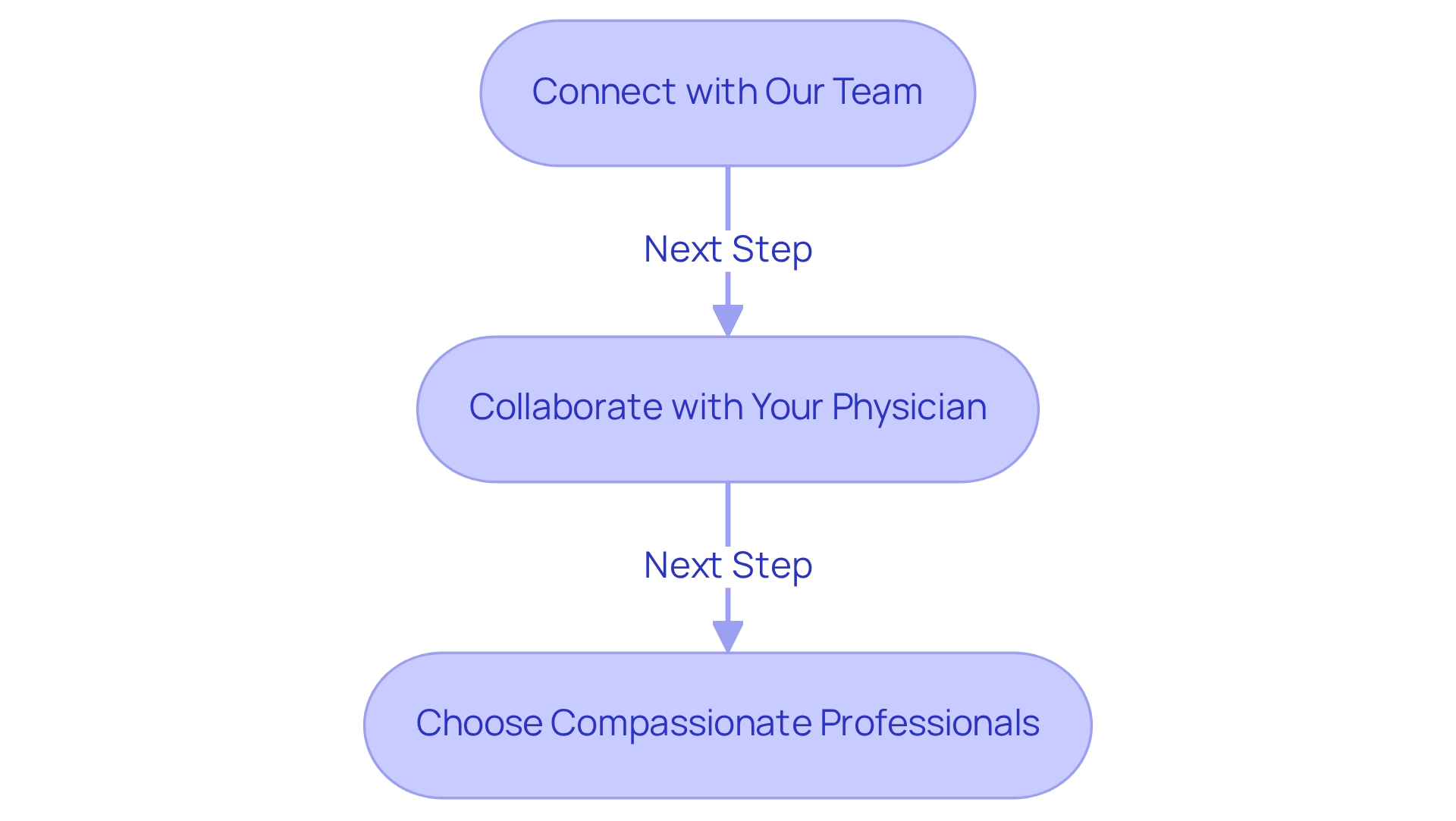
Reliability: Ensuring Consistent Support for Clients
Reliability in caregiving is paramount, embodying the dependability and consistency essential for providing effective care. Seniors often depend significantly on their companion caregiver for daily activities, medication management, and companionship. A dependable provider not only adheres to schedules but also fulfills commitments and communicates effectively with patients and their families. When companion caregivers consistently arrive punctually and fulfill their responsibilities, it strengthens a sense of security and trust in the client-provider relationship. Research shows that 85% of seniors feel more secure when their caregivers are timely, highlighting the direct relationship between caregiver dependability and client trust.
Evaluating whether an elderly relative requires caregiver services involves examining their ability to perform daily tasks and their overall health condition. Signs indicating the need for these services include:
- Difficulty with personal hygiene
- Dressing
- Cooking
- Cleaning
- Managing medications
Health issues such as chronic conditions, frequent hospital stays, or recent surgeries requiring continuous attention are also significant factors. Caregivers trained to manage emergencies or unforeseen changes in a person’s condition can provide prompt support, ensuring that individuals receive the essential attention they need most. This level of reliability not only enhances the overall quality of assistance provided by the companion caregiver but also strengthens the caregiver-client bond, nurturing a deeper sense of trust and comfort. In fact, reliable caregiving significantly improves patient satisfaction and health outcomes, with a 30% increase in positive health results reported among individuals with dependable caregivers.
Furthermore, technology plays a crucial role in enhancing reliability in caregiving. Advancements in patient observation and service provision have made it easier for providers to deliver consistent assistance. These innovations ensure that support providers can respond promptly to any changes in a client’s condition, further solidifying the bond between provider and client. Clear communication with the support provider and the home assistance agency is vital. Frequent check-ins with your loved one to discuss their experiences and any concerns can help ensure quality support.
Lastly, incorporating fall prevention programs is critical for safeguarding seniors. Dependable support providers should be proactive in implementing these measures, ensuring that individuals remain safe and secure in their homes. By addressing these aspects of reliability, providers can significantly enhance the quality of care offered to seniors.
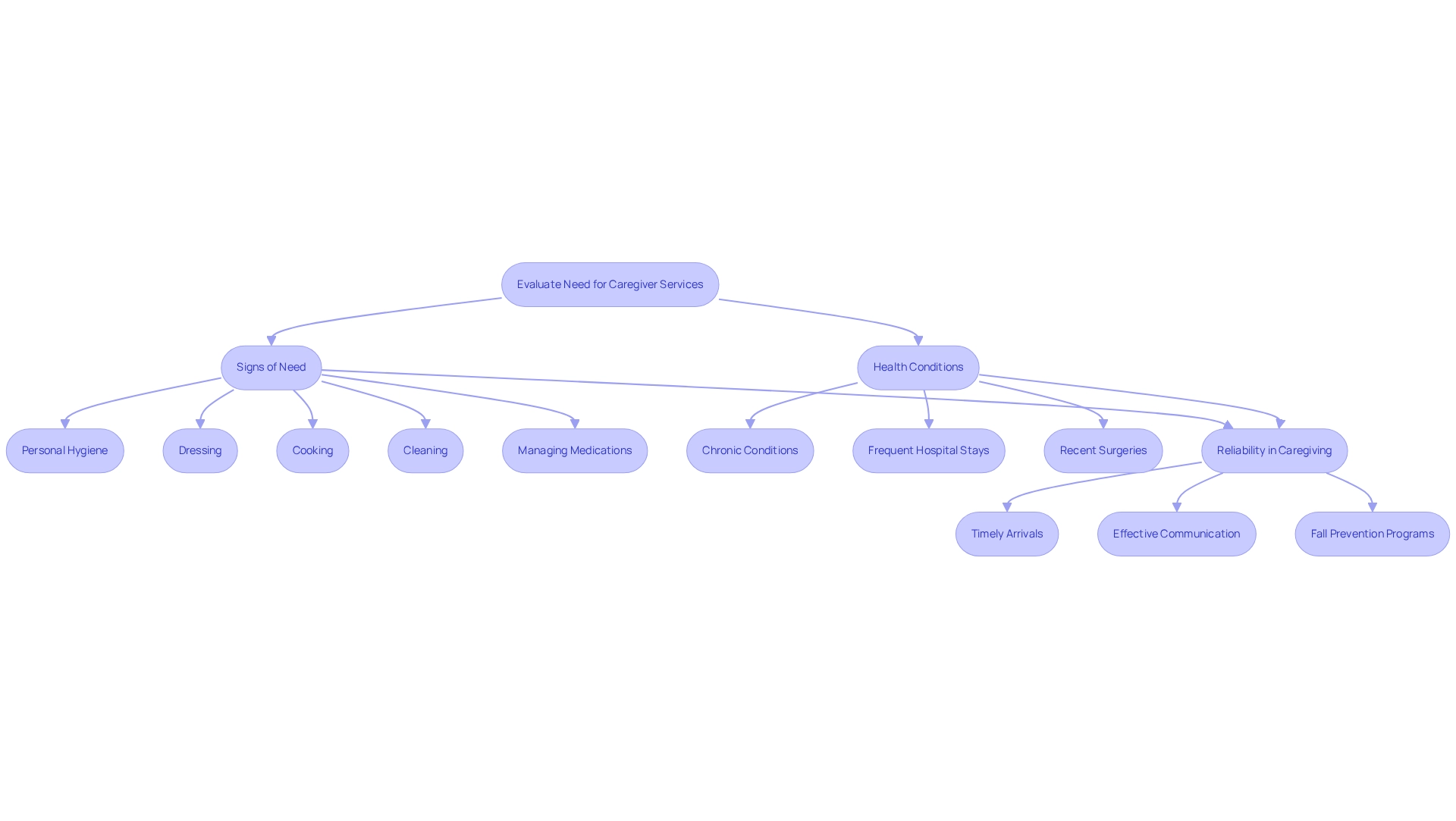
Communication Skills: Building Trust and Understanding
Strong communication abilities are essential for companion care givers to establish rapport and trust with those they assist. This encompasses not only verbal exchanges but also non-verbal cues such as body language and facial expressions. Companion care givers should prioritize active listening, ensuring that individuals feel acknowledged and understood. For instance, when a patient expresses unease or worry, a supporter who listens carefully and reacts suitably can greatly lessen anxiety and enhance a feeling of safety.
In addition, providers must communicate clearly with family members and healthcare professionals. Clear conversations about a patient’s status, preferences, and treatment plans are crucial for coordinated support. This is especially important for family members who may feel overwhelmed and stressed, as effective communication can ease some of that burden. Research shows that those who excel in communication enhance health outcomes, fostering a collaborative environment where all individuals involved in the patient’s welfare are informed and aligned. This comprehensive method not only improves the standard of assistance but also strengthens the confidence that is essential for effective support, particularly in the role of a companion care giver at Best Care Nurses Registry.
Our thoroughly vetted companion care givers are trained to interact efficiently with individuals and their families, ensuring that everyone is aligned regarding treatment plans. Statistics show that effective communication can lead to a 30% increase in client satisfaction and a 25% improvement in health outcomes. As healthcare expert Adelman states, “Additional research is required to establish if this program will have lasting impacts on the health of a more varied group of informal supporters and recipients of assistance or the healthcare they obtain.”
Furthermore, cognitive testing conducted with community caregivers revealed that clarity in communication significantly reduces confusion and enhances the caregiver-client relationship. This evidence highlights the significance of communication abilities in promoting trust and understanding in caregiving, ultimately guaranteeing that seniors obtain the personalized support they require to feel secure and content at home.
If you are feeling overwhelmed, remember that you don’t have to do it alone. Contact Best Care Nurses Registry today at (888) 203-2529 to discuss how we can help you create a customized care plan for your loved one.
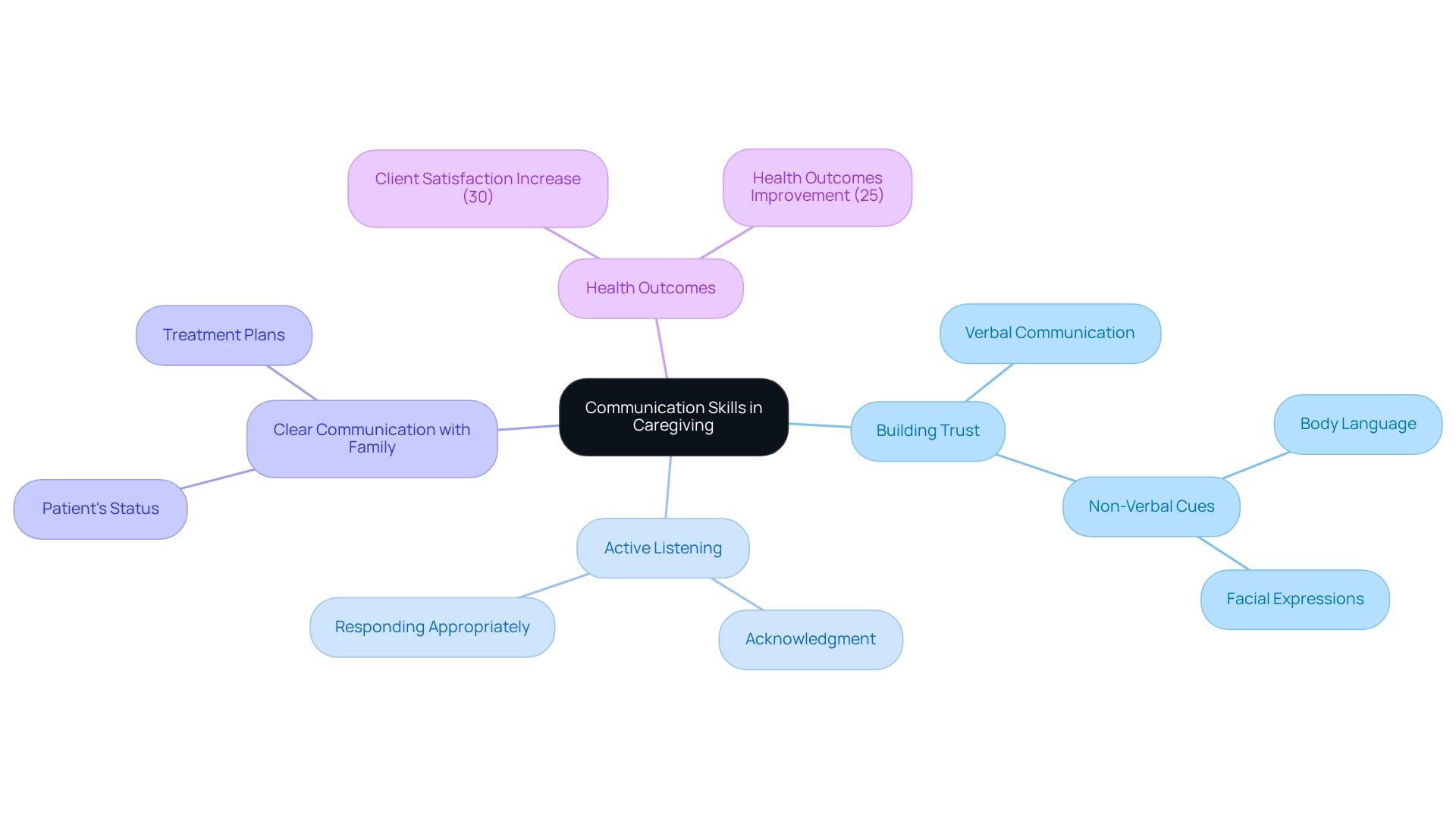
Adaptability: Meeting Diverse Client Needs
Flexibility in caregiving is essential for a companion care giver to effectively meet the unique and evolving needs of individuals. Each person has distinct preferences, routines, and health conditions, which require support providers, such as CNAs and HHAs from Best Care Nurses Registry, to adapt their approaches. These compassionate companion care givers are available for hourly assistance, providing the adaptability necessary to meet the specific needs of those they care for.
As a companion care giver, they play a vital role in assisting individuals with daily living tasks while keeping family members informed about the patient’s condition, ensuring that support is both individualized and attentive. For instance, a companion care giver may need to adjust their communication style or daily activities based on an individual’s cognitive abilities or physical limitations.
Caregivers often encounter unexpected challenges, such as sudden changes in a person’s health or emotional well-being. An adaptable companion care giver can swiftly reassess the situation and modify the support plan as needed. This flexibility not only enhances the quality of care provided by a companion care giver but also reassures individuals that their personal needs are prioritized and valued.
The significance of adaptability is emphasized by the growing desire among older Americans to age in place, as highlighted by recent findings from the National Center for Biotechnology Information. Furthermore, statistics reveal that the cost of care for individuals with Alzheimer’s disease is three times higher than for those without dementia, emphasizing the need for caregivers who can effectively manage complex health situations.
Flexible companion care givers from Best Care Nurses Registry can significantly improve the quality of care for clients with such conditions by tailoring their approaches to meet specific needs. In the face of industry challenges, such as workforce shortages and increased competition from technology-driven solutions, the ability of companion care givers to adapt is crucial for maintaining high-quality home support services.
A case study on home care challenges illustrates that addressing workforce shortages and adapting to technological advancements are essential for the sustainability of home care services. Additionally, economic pressures on caregivers are apparent, with 47% of caregivers earning less than $50,000 annually, according to the National Alliance for Caregiving and AARP. Caregivers who embrace flexibility can better respond to the diverse needs of elderly individuals, ultimately leading to greater satisfaction and well-being.
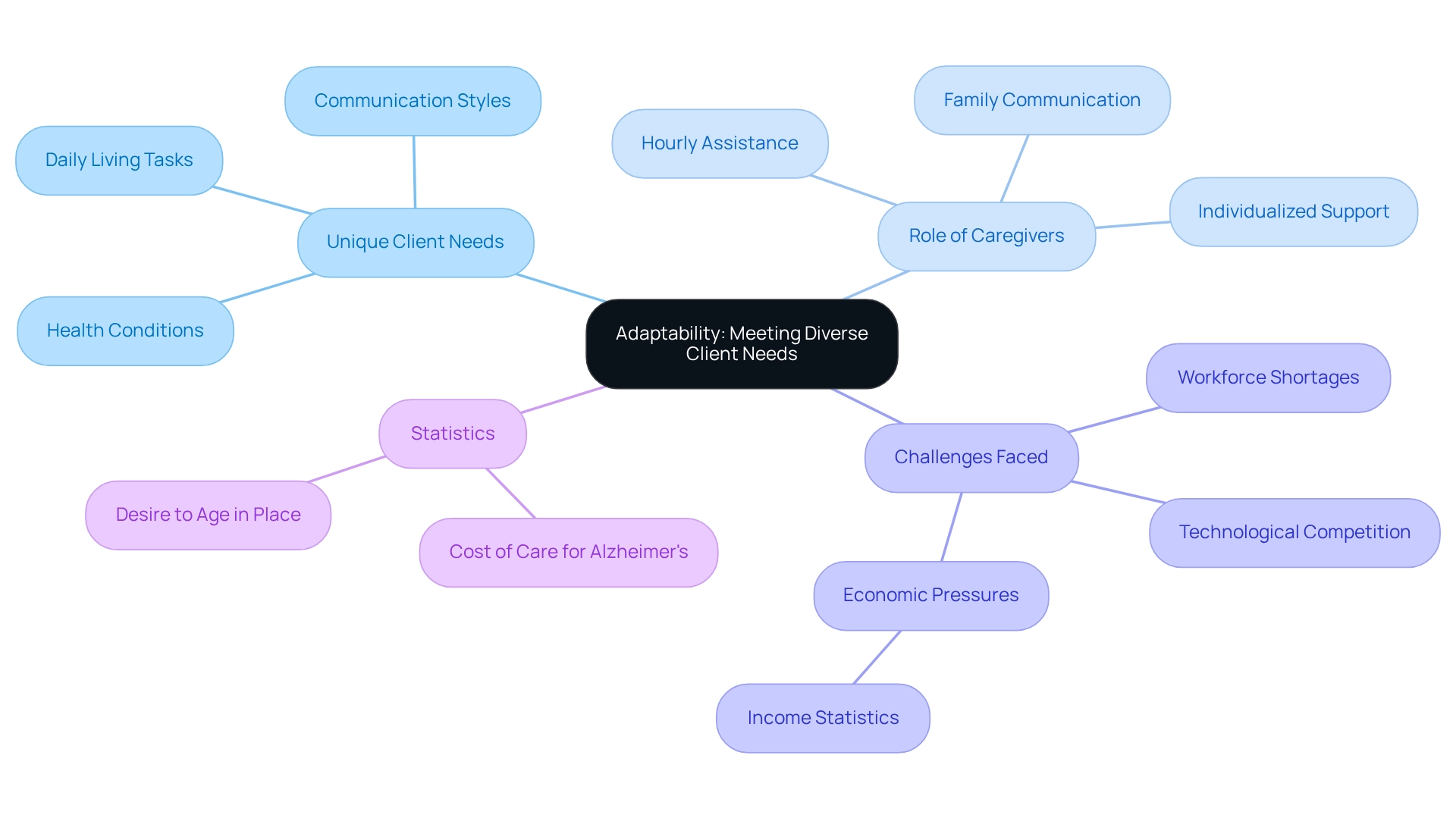
Patience: Navigating Challenges with Grace
Patience is a fundamental quality in effective caregiving, particularly for a companion caregiver supporting seniors who may experience confusion, frustration, or emotional distress. Companion caregivers who embody patience approach these sensitive situations with empathy, allowing individuals to express their feelings without fear of judgment. For instance, when a senior struggles to complete a task or articulate their needs, a compassionate companion caregiver provides essential assistance, ensuring that the individual feels neither hurried nor stressed. Furthermore, patience empowers companion caregivers to remain calm during challenging exchanges, such as when individuals resist assistance or exhibit difficult behaviors. By staying composed and patient, companion caregivers can de-escalate tense situations, creating a more positive environment for themselves and their clients. This approach not only enhances the quality of care provided by a companion caregiver but also significantly alleviates emotional distress for seniors.
Recognizing the signs that a loved one may need additional support is crucial. Key indicators include:
- Difficulty with daily activities such as personal hygiene, dressing, cooking, or managing medications.
- Signs of social isolation, such as loneliness, depression, or withdrawal.
- Safety concerns, including frequent falls or accidents.
Families can benefit from the support of a companion caregiver who practices patience, helping them navigate these discussions to ensure a smooth and respectful transition to receiving care. In challenging situations, such as addressing a person’s anxiety or frustration, a compassionate supporter can transform potential disputes into opportunities for connection and trust. As Bisera Dimitrijevic, an SEO Content Writer, observes, ‘A companion caregiver who demonstrates patience and empathy is more effective in establishing trust and can better comprehend individuals’ distinct requirements.’ This insight underscores the essential role of patience in enhancing the overall companion caregiver experience, ultimately benefiting both the companion caregivers and those they assist. By encouraging open dialogue and regularly assessing the individual’s needs, companion caregivers can ensure that the support provided is both attentive and considerate, improving the quality of life for seniors. Remember, we’re here for you, and your comfort is our priority.

Experience: Leveraging Knowledge for Better Care
Experience is a cornerstone of effective companion care giver services, significantly influencing the quality of care provided. Companion care givers with a robust background are often more skilled at identifying subtle signs of distress or shifts in a client’s condition. For instance, a skilled provider may notice minor alterations in behavior that indicate a need for medical assistance or emotional support, which can be vital for prompt interventions.
Moreover, experienced companion care givers excel in implementing and modifying treatment strategies based on their vast expertise. They utilize previous experiences to make informed choices, resulting in more effective interventions customized to individual requirements. This depth of understanding not only enhances the care experience for individuals but also fosters confidence among families, who can rest assured that their loved ones are receiving attentive and capable support from a companion care giver.
Statistics reveal that caregivers are proactive in seeking health information, often utilizing online resources to better understand their responsibilities. This commitment to continuous learning and adaptation underscores the importance of experience in caregiving, as it directly correlates with improved client health outcomes. Companion care givers with more experience are better equipped to recognize and respond to the nuanced needs of seniors, ultimately enhancing their quality of life. Without adequate CNA/HHA support services, seniors may encounter health declines, poor nutrition, hygiene problems, and heightened risks of falls—all of which skilled professionals can help alleviate.
Furthermore, experienced companion care givers recognize the value of presence and comfort during visits. As Margaret S. wisely noted, “Take comfort in knowing you don’t need to fill up the silence to have a visit be meaningful.” This approach fosters a supportive environment that can significantly benefit clients, alleviating feelings of loneliness and contributing to their emotional well-being.
Additionally, the financial implications of caregiving cannot be overlooked. The typical family supporter for an individual 50 years or older spent $5,531 annually on out-of-pocket caregiving costs. Skilled caregivers can assist in reducing unnecessary expenses through efficient support, enhancing their significance to families facing these challenges. By providing personalized care tailored to seniors’ needs, Best Care Nurses Registry enhances the quality of life and independence of those they serve.
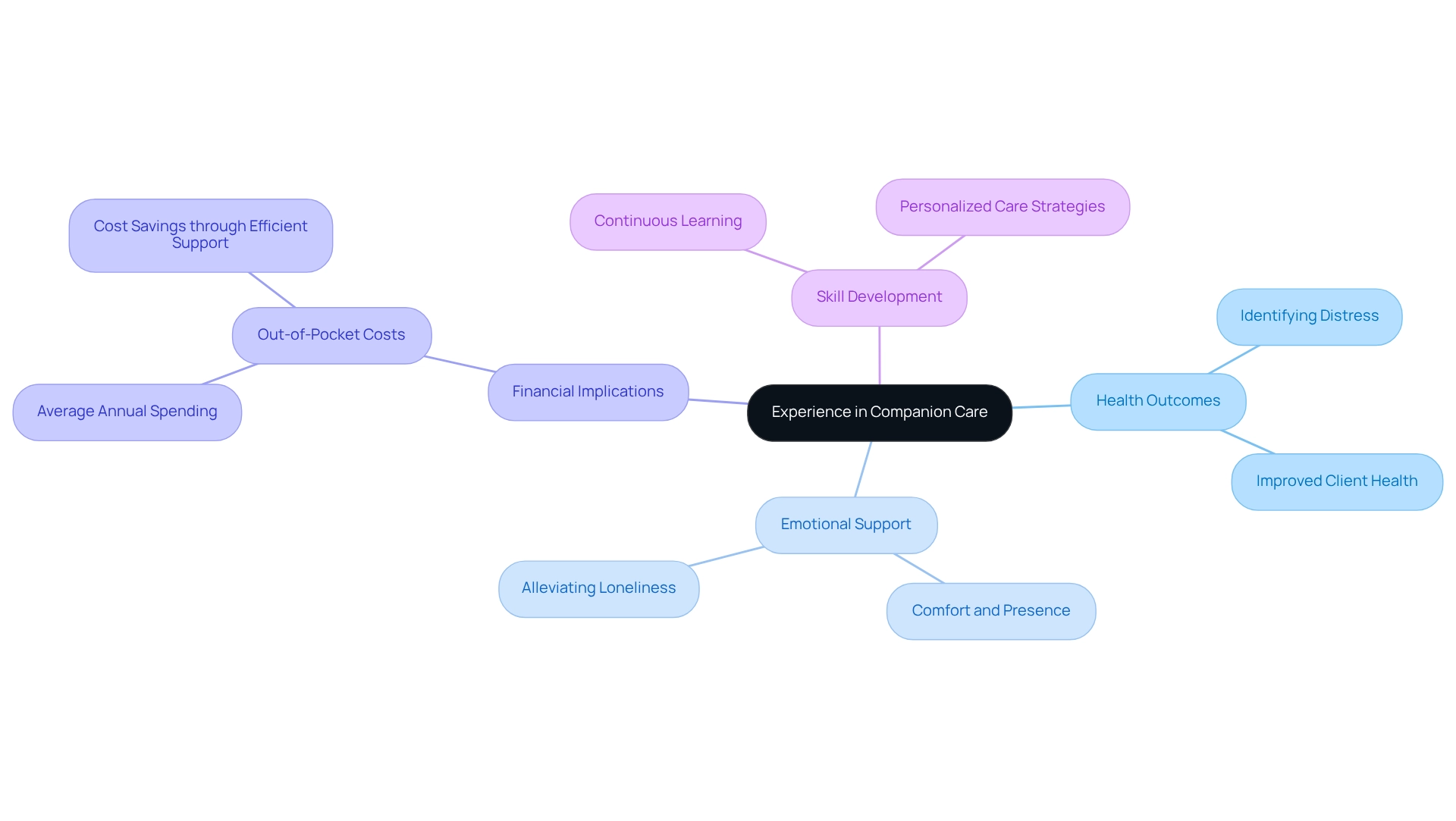
Companionship: Enhancing Emotional Well-Being
Companionship, provided by a companion caregiver, is a cornerstone of effective caregiving, especially for seniors who often face loneliness and social isolation. Caregivers referred by Best Care Nurses Registry engage in meaningful interactions—whether through sharing stories, participating in activities, or simply being present—which can profoundly enhance the emotional well-being of those they support. For instance, individuals who dedicate time to play games or relish nature walks with those they assist cultivate a sense of connection and happiness, vital for mental well-being. Nature therapy, in particular, has been shown to promote mental health, social connections, and overall quality of life for seniors.
Research indicates that seniors with regular social interactions experience significantly lower rates of depression and anxiety. In fact, companionship can result in enhanced mental health outcomes, reinforcing the notion that those who provide support fulfill not only a physical requirement but also a vital emotional one. According to gerontologist Dr. Jane Smith, “Social interaction is vital for the emotional health of seniors; it can significantly reduce feelings of loneliness and enhance their overall quality of life.” By emphasizing companionship, professionals from Best Care Nurses Registry enhance their patients’ overall happiness and quality of life, which makes companion caregiver a crucial element of senior support.
Best Care Nurses Registry also offers customized care plans tailored to meet the unique needs of each client, ensuring that they receive the most appropriate support. Our providers are thoroughly evaluated for their abilities and empathy, offering reassurance for families. If you are seeking compassionate support referrals, we’re here for you. Contact us today at (888) 203-2529 to arrange a consultation and talk about how we can assist your loved one flourish at home.
Professionalism: Upholding Standards in Care
Professionalism is an essential attribute that companion care givers must uphold to ensure the highest standards of assistance. This includes being punctual, engaging in respectful interactions, and strictly adhering to ethical guidelines. When providers exemplify professionalism, they cultivate an atmosphere of trust and respect, which is vital for effective companion care giver services.
Furthermore, professionalism involves a commitment to continuous education and training, enabling providers to stay informed about best practices in the field. Engaging in professional development not only enhances the skills of companion care givers but also significantly elevates the quality of care they deliver. For instance, companion care givers who participate in specialized training programs are better equipped to address complex medical needs and behavioral challenges, ensuring that individuals receive optimal assistance.
Studies indicate that the quality of companion care giver training is directly linked to individual outcomes, underscoring the importance of professionalism in building trust. Research has shown that higher levels of professional conduct among companion care givers lead to increased patient satisfaction and improved health outcomes. This highlights the necessity for companion care givers to maintain high ethical standards and continually enhance their skills, ultimately benefiting both patients and their families.
Additionally, Best Care Nurses Registry embodies this dedication to professionalism through its tailored services and adaptability. Since 1980, the company has been committed to providing comprehensive home health services in South Florida, focusing on safety, convenience, and emotional support for seniors and their families through our companion care giver. Their approach not only boosts client satisfaction but also fosters trust through compatible support matches, including options for a companion care giver and various payment methods.
As Annette noted, the challenges of staffing and responsibility highlight the need for well-trained companion care givers who can effectively manage support demands. Moreover, Sophie’s situation illustrates how a companion care giver can provide professional assistance that leads to greater independence and engagement in life activities, showcasing the positive outcomes that arise from elevated service standards.
If you are seeking compassionate and professional home health support, we invite you to reach out to Best Care Nurses Registry today at (888) 203-2529. Let’s discuss your needs and arrange a consultation. Your loved ones deserve the finest support available, and we are here to assist you every step of the way.
Commitment to Education: Staying Informed for Better Care
A dedication to continual learning is essential for companion care givers who provide the highest quality of support. This is particularly important considering the considerable dangers seniors face without CNA/HHA assistance, such as health deterioration, inadequate nutrition, hygiene concerns, and heightened social isolation. Participating in training programs, attending workshops, and staying informed about the latest developments in geriatric support are vital practices that can make a real difference.
Studies show that individuals who engage in ongoing learning are better prepared to tackle new health challenges, understand innovative treatment options, and utilize effective communication methods. Furthermore, continuous education allows caregivers to adapt to the changing needs of the people they support. As health conditions evolve, those knowledgeable about the latest treatment methods can apply prompt and efficient measures, ensuring that recipients receive the essential assistance they need.
This commitment to education not only improves client outcomes but also fosters professional development and job fulfillment among providers. This creates a more skilled and confident workforce in home health services, which is crucial for delivering compassionate care.
Statistics indicate that 31% of recipients who are not in assisted-living or skilled nursing facilities live alone. This underscores the necessity for companion care givers to be well-educated in order to deliver personalized and informed support. The absence of professional caregiving can lead to health declines, poor nutrition, hygiene issues, and increased social isolation among seniors.
Moreover, case studies reveal that those providing assistance often rely on their social networks for support and information related to health matters. This illustrates their proactive involvement in managing health services. Success stories from communities highlight innovative solutions, such as mobile app programs that connect support providers with local services. These examples showcase the advantages of ongoing education and training initiatives.
By engaging in ongoing education, providers can significantly enhance the quality of assistance they deliver. This ultimately benefits both themselves and those they serve, reinforcing the idea that we’re here for you, and your comfort is our priority.
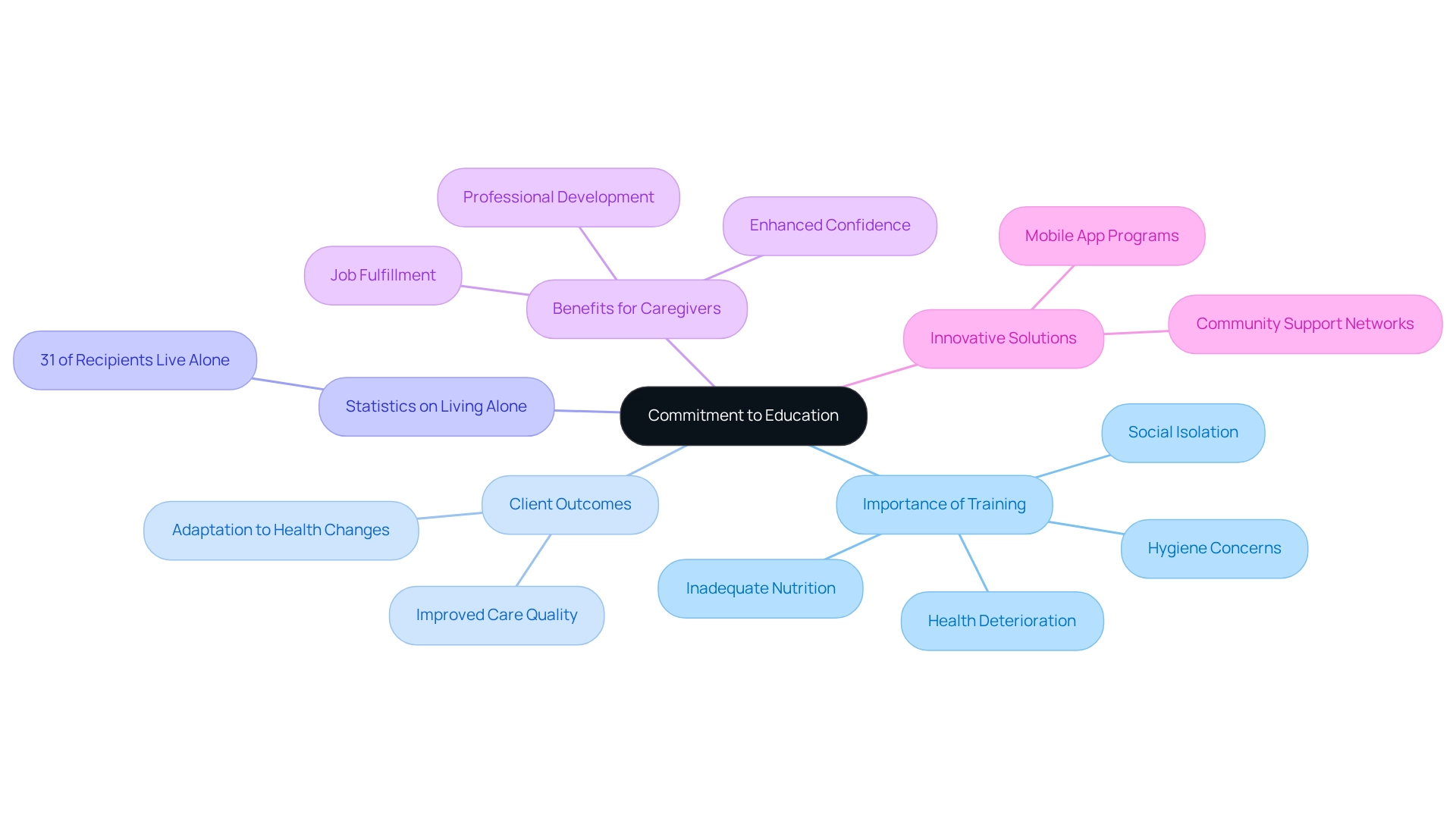
Best Care Nurses Registry: Matching Clients with Quality Caregivers
At Best Care Nurses Registry, we understand that finding the right companion care giver is not just about meeting specific needs; it’s about creating a meaningful connection that resonates with your personality and lifestyle. Our tailored approach ensures that you receive care from companion care givers who not only have the necessary skills but also share your interests and preferences. This connection can significantly enhance your experience as a companion care giver, making it more interactive and enjoyable.
The impact of effective matching in companion care giver services extends well beyond mere compatibility; it is crucial for improving treatment outcomes. Research indicates that when individuals feel comfortable and understood by their companion care giver, they are more likely to engage actively in their treatment plans and express their needs openly. This collaborative relationship not only elevates the quality of support from the companion care giver but also fosters a positive environment for both clients and caregivers.
As the demand for personal support aides and home health aides is projected to reach 924,000 by 2031, the importance of personalized companion care giver pairing becomes increasingly clear. Organizations that can adeptly navigate the complexities of companion care giver-client satisfaction and retention will emerge as leaders in the evolving home support landscape. Jarica Steinke aptly notes, “The evolution of home care is considerable, and those who can solve the equation of caregiver-client satisfaction and retention will be the big winners.” This underscores the significance of effective alignment in meeting the growing needs of our clients for companion care giver services.
Moreover, a case study illustrates the consequences of poor matching: an assistant distracted by their phone neglected a person’s needs, leading to safety concerns. This instance highlights the vital role of attentiveness in caregiver-patient relationships and reinforces the necessity of ensuring that caregivers are fully engaged with those they serve.
Best Care Nurses Registry exemplifies our commitment to individualized assistance from a companion care giver, ensuring that each client receives the attention and support they truly deserve. With a dedicated team of experienced professionals, including Brianna, Lucinda, Sherie, and Jacque, we not only enhance the caregiving experience but also set a benchmark for quality care in the industry. By focusing on compatibility and understanding, we strive to ensure the best possible outcomes for your loved ones through our companion care giver services.
To discuss your specific needs and explore how we can assist you or your loved one, please call us at (888) 203-2529. We are here for you and look forward to helping you find the right companion care giver for your situation. Additionally, we invite you to share your experiences with us, as your testimonials can guide others seeking our services.
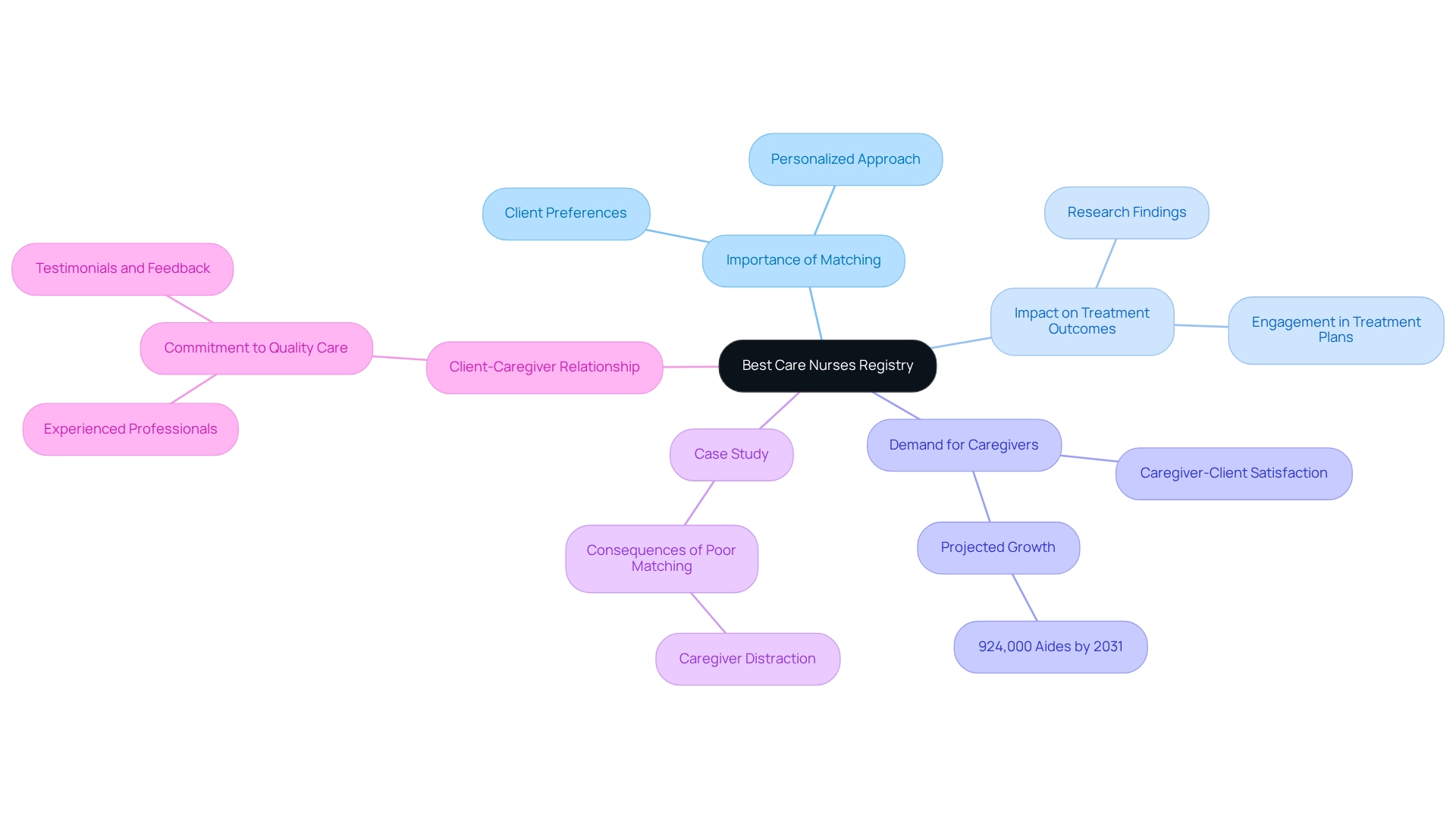
Conclusion
The qualities that define an effective caregiver are crucial in enhancing the quality of life for seniors and their families.
- Compassion serves as the foundation of caregiving, allowing caregivers to form deep emotional connections that alleviate feelings of loneliness and anxiety.
- Reliability reassures clients, fostering trust through consistent support.
- Effective communication builds rapport, ensuring all parties involved in care are aligned.
- Adaptability enables caregivers to meet the diverse and changing needs of their clients, ensuring personalized care tailored to individual circumstances.
Patience plays a vital role in navigating the challenges that arise in caregiving, allowing caregivers to handle difficult situations with grace and empathy.
Experience equips caregivers with the knowledge necessary to recognize subtle changes in clients’ conditions, leading to timely interventions.
Companionship is essential for emotional well-being; meaningful interactions can significantly reduce feelings of isolation.
Professionalism and a commitment to ongoing education ensure that caregivers maintain high standards of care, continually improving their skills to meet the evolving needs of those they serve.
Ultimately, the integration of these qualities not only elevates the caregiving experience but also fosters a supportive environment where clients can thrive.
As the demand for personalized home care continues to grow, the importance of matching clients with caregivers who embody these characteristics cannot be overstated.
By prioritizing the emotional and physical needs of seniors, caregivers can make a profound impact on their clients’ lives, ensuring they receive the compassionate and dedicated care they deserve.
Frequently Asked Questions
What does compassion in caregiving involve?
Compassion in caregiving transcends mere kindness; it embodies a profound understanding and responsiveness to the emotional needs of individuals, especially seniors who may cherish their pets.
How does Best Care Nurses Registry support seniors and their pets?
Best Care Nurses Registry has a pet-friendly approach that ensures both clients and their furry companions receive the support they deserve, fostering a nurturing environment for seniors to express their feelings and concerns.
Why is emotional support important for older adults?
Emotional support is crucial for older adults as it helps alleviate feelings of loneliness and anxiety, enhancing their overall mental well-being through meaningful conversations and attentive listening.
How do empathetic caregivers contribute to patient care?
Empathetic caregivers can notice subtle shifts in their patients’ moods or health, allowing for timely interventions that can prevent potential complications and enhance the quality of service.
What is the process to receive compassionate home assistance from Best Care Nurses Registry?
The process includes connecting with the team to discuss needs, collaborating with a physician to create a tailored care plan, and choosing from recommended compassionate professionals.
What are some signs that an elderly relative may need caregiver services?
Signs include difficulty with personal hygiene, dressing, cooking, cleaning, managing medications, and health issues like chronic conditions or recent surgeries requiring continuous attention.
How does caregiver reliability impact seniors?
Reliable caregivers enhance the sense of security and trust in the client-provider relationship, with research showing that 85% of seniors feel more secure when their caregivers are timely.
What role does technology play in caregiving reliability?
Technology enhances caregiving reliability by improving patient observation and service provision, allowing providers to respond promptly to changes in a client’s condition.
Why are strong communication skills essential for companion caregivers?
Strong communication skills help establish rapport and trust with clients, ensuring that their needs are understood and addressed effectively, which can lead to improved health outcomes.
How can families ensure quality support for their loved ones?
Families can ensure quality support by maintaining clear communication with caregivers and the home assistance agency, and by frequently checking in with their loved ones to discuss their experiences and any concerns.

